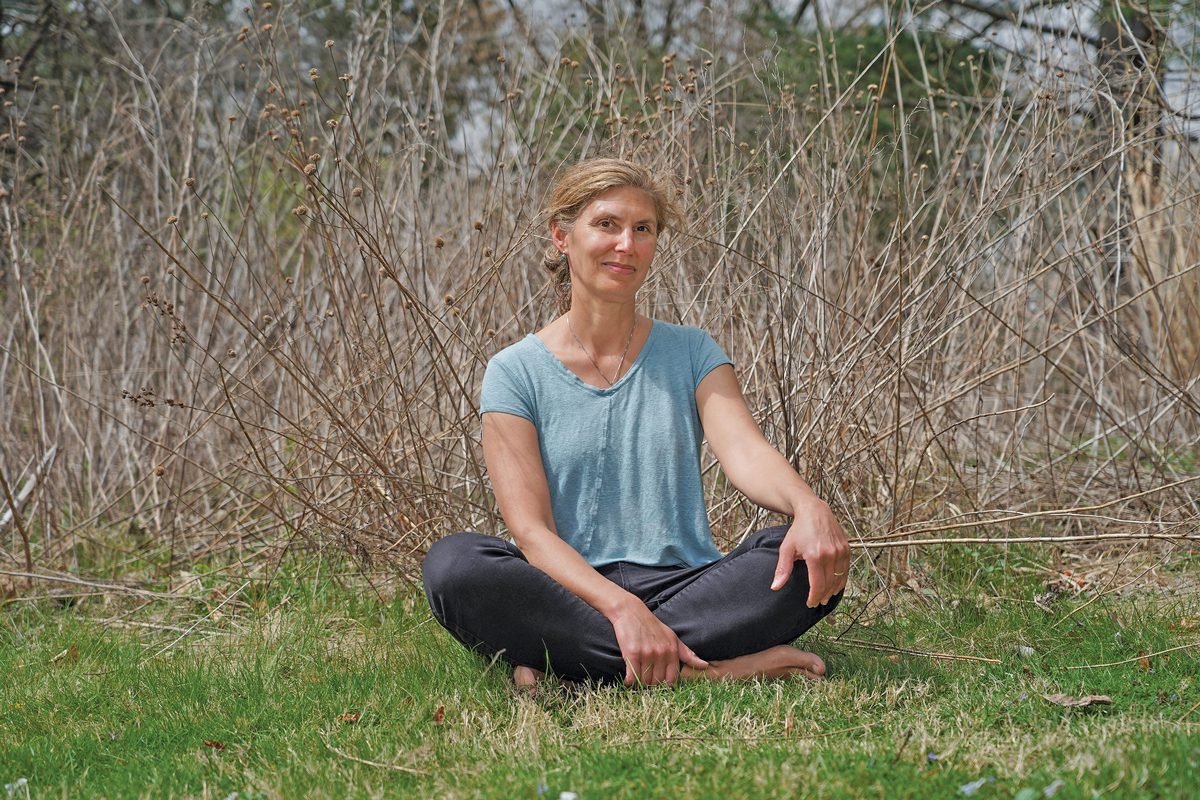
Photo by J. Adrian Wylie
It’s a cold spring afternoon, but ecologist Sheila Schueller is determined to find signs of life in her backyard pond. She scoops a wiggling alien-looking creature into her net. “Ooh, you see how it has baby wings right there?” she asks. Come summer, she explains, this nymph with the bulging eyes will emerge as a dragonfly and “eat up” any mosquitoes.
Schueller, fifty-two, delights in making connections in nature and helping others to do the same. A lecturer for the U-M School for Environment and Sustainability and a community educator and organizer, she says anyone can “create a habitat” in a yard—or even in pots on a patio.
“If you build it, they will come,” she says. “If you have the right stuff there, you’ll suddenly have all this insect life that then leads to more birds that you’ve never had before.”
Ann Arbor’s Pollinator-Aware Yard Care initiative (formerly No Mow May) offers year-round ideas to get started, Schueller says. In addition, residents are “lucky to be loaded” with city and county educational and volunteer programs, and smaller groups like Seeds To Community, which teaches people how to grow native seeds and plants and offers a seed exchange.
“You don’t have to be a purist,” she says of pollinator-friendly landscaping. She’s kept her home’s roses and Japanese maple but added a mini prairie and a small rain garden that she created through Washtenaw County’s master rain gardener class.
“We still need lawns for kids to play,” but she urges the end of pesticide use. “Maybe keep a little patch unmowed and create a little native plant bed. It’s a food desert until you put in native plants that are edible.” (Goldenrod is a great start, she says.) In the fall, “leave the leaves and stems to provide a habitat for insects over the winter.”
Related: Susan Bryan
Schueller, who was born in Jamaica—where her father worked as an engineer for Goodyear and her mother was a homemaker—says she’s “imprinted with memories from being outside” as a young child, with avocado and mango trees in her backyard. Before she started kindergarten, the family moved to Akron, Ohio, where she’d explore empty lots and catch crayfish in the creek with her older sister. “To us,” she says, “it was this whole wilderness.”
She spent summer vacations in her father’s native Austria—where she’d “lie in the meadow and listen to bees,” which became her “comfort sound”—as well as her mother’s homeland of Greece. Her parents met when her mother took a summer job at the Goodyear factory in Thessaloniki. Today they live in a small village in Crete.
In high school, Schueller’s father’s job took them to Luxembourg, where they lived near a forest and cow pasture. As a family, they’d watch All Creatures Great and Small on TV, and she dreamed of becoming a veterinarian but eventually traded the idea of “blood and guts” science for a fascination with “solving mysteries and the complexities of a system.” She recalls watching Gorillas in the Mist, and “I asked my mom, ‘what is a PhD?’” she laughs. “The seed was planted.”
Schueller met her future husband (now a U-M physician) at Swarthmore College, where they both studied biology and bonded over bioluminescence on the beach during a visit to the Delaware coast. She moved to Ann Arbor in 1995 for graduate studies and got her PhD in ecology and evolutionary biology from the U-M with a dissertation on hummingbird pollination. They have a daughter who is a high school senior.
Schueller’s postdoc mentor, Steve Yaffee, a U-M SEAS professor, says “it’s hard not to get jaded” with the challenges of conservation work, but Schueller “continues to feed people’s passions. … She’s unique in that she’s an empathetic systems thinker who understands how to integrate systems thinking with collaborative engagement and what motivates people.”
After she taught ecology at EMU for several years, U-M SEAS recruited her in 2014 to teach a master’s ecology course. She added a field lab to the class, and 120 students now study the ecosystems of river, forest, and prairie. “The ultimate goal,” she says, is to help students who don’t necessarily specialize in ecology “make real-world decisions that are more inspired and informed.” She also teaches a SEAS master’s project course with a conservation and restoration theme, with client-based projects that have ranged from restoration of an Ecuadorian rain forest to U-M’s certification as a “Bee Campus” committed to pollinator conservation through the Xerces Society for Invertebrate Conservation.
A member of St. Nicholas Greek Orthodox Church, Schueller worked with her daughter last year to help make its June Ya’ssoo Greek Festival—which serves some 8,000 plates of food in one weekend—into a zero-waste event using compostable serving ware and increased recycling. She’s a guest speaker for the Michigan Conservation Stewards Program and also works with the Stewardship Network, where she presents at “Stewards’ Circles,” organizes professional stewardship hikes, and connects her master’s students to its conservation projects. “She’s tremendous at bridging the gap between research and practice” and “always brings her energy and positive outlook,” says Stewardship Network founder and CEO Lisa Brush.
A creative cook—“my husband says I never make the same thing twice!”—Schueller uses dandelion greens from her yard in salads, vegetables from her daughter’s garden in the backyard, and produce from the Ann Arbor Farmers Market, which she calls “my happy place.”
In her Water Hill neighborhood, she’s seen firsthand how nature can connect and engage others. Since two of her neighbors added water features to their yards, the neighbors now enjoy a boisterous frog chorus each spring. She recalls inviting the two young kids next door to check out the tadpoles in her pond. Soon they were ringing her doorbell to visit again.
“That childhood curiosity exists in all of us,” she says. “We just need a time and space to enjoy it.”
Related: Planting a Pocket Forest